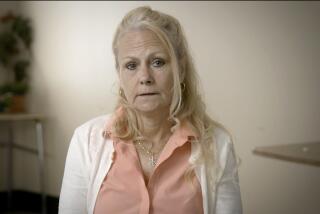New Technology, Tenacity Credited for Slaying Arrest
- Share via
Preserved body fluids that contain DNA samples, an increasingly crucial element in homicide cases, provided the key evidence to bring murder charges against a Palmdale man 14 years after he allegedly raped and drowned a woman in the Navy, investigators said Friday.
The case against Richard H. Whittle, 38, depends greatly on technology that did not exist when the crime was committed on a Virginia Navy base, federal prosecutors said.
In addition to the DNA evidence, new technology helped identify a fingerprint, which was too smeared to use in the original investigation, as made by Whittle, they said.
The print was saved along with body fluids, hairs and other evidence collected when Pamela Ann Kimbrue’s body was found in her car at the bottom of Willoughby Bay on the Norfolk Naval Air Station in March 1982.
That newly interpreted evidence--along with the persistence of investigators determined to nail the killer of the 21-year-old woman from Bay City, Mich.--all led to Whittle’s appearance in federal court Thursday on a murder charge.
To federal officials, it was about time.
“He got away with murder for 14 years didn’t he?” said Assistant U.S. Atty. Laura Everhart, who is prosecuting the case in Norfolk.
Everhart said semen samples collected from the scene in 1982 were preserved and will be used as evidence in the case against Whittle. Also, new methods of studying fingerprints enabled investigators to conclude that no one but Whittle could have left a fingerprint found on Kimbrue’s car window in 1982, she said.
“DNA is certainly going to play a part in this case,” she said. “And that technology was not in existence in 1982.”
Authorities said the existence and use of evidence from years ago does not mean that investigators fell short in the past. If anything, it shows how careful the initial investigators were to preserve evidence that could be reexamined more than a decade later, they said.
Federal prosecutors credited investigators with the cold case squad of the Naval Criminal Investigative Service in Norfolk and Los Angeles with making the case.
The squad, formed in January 1995, was created to investigate unsolved homicides using the latest in forensic technologies and other methods.
Joe D. Kennedy, a special agent with NCIS and one of two lead investigators on the Whittle case, said the new technology was important, but so were renewed interviews of Whittle’s past acquaintances and reviews of evidence.
“The main thing in cold cases is that relationships between people change,” he said. “The whole key is tenacity and just going over the case and redoing the leads.”
“We just pull out all the stops,” Kennedy said. “We’re never going to bring that girl back . . . Hopefully, it may give [relatives] a little peace of mind. That’s all we can hope for.”
Since the case was reactivated in May 1995, investigators obtained statements from some of Whittle’s past acquaintances that contradicted what Whittle said years ago.
Whittle, a suspect shortly after Kimbrue’s body was discovered, told investigators at that time that he did not know Kimbrue, but later allegedly told at least one former colleague that he was the “last person to see her alive,” Navy investigators said.
The body of Kimbrue--like Whittle, a Navy courier--was found in the rear seat of her car when it was retrieved from the bottom of the bay, with the seat belt around her neck. Court documents indicate her wrists had been roped together, she had been beaten on the head and face and sexually assaulted.
An autopsy determined that Kimbrue died of “drowning following mechanical strangulation.”
Navy investigators said Whittle, who worked various odd jobs at a clinical laboratory in Burbank, was discharged from the Navy in July 1983 because of narcotics violations.
A hearing is scheduled Tuesday in Los Angeles federal court to determine whether he will be sent to Virginia to stand trial. He is being held without bail and faces up to life in prison if convicted.
The accusation against Whittle left many of his neighbors, friends and acquaintances shaking their heads in disbelief. Several said they know him only as an easygoing man devoted to his wife and young daughter.
Matt Summers, who said he welcomed Whittle to their Palmdale neighborhood about five years ago, could not believe his friend faced a murder charge.
“Richard is one of the most decent, loving people I’ve met in my life,” said Summers, who was visibly shaken by the news. “He’s done nothing but give, give, give.”
Summers said he was in contact with Whittle’s wife, who did not answer the door to the family home on Friday.
“She said she stands behind Richard 110%,” Summers said.
Times correspondent John Gonzales contributed to this report.
More to Read
Sign up for Essential California
The most important California stories and recommendations in your inbox every morning.
You may occasionally receive promotional content from the Los Angeles Times.













